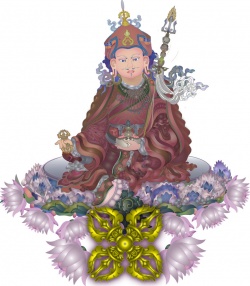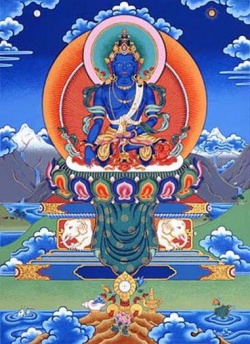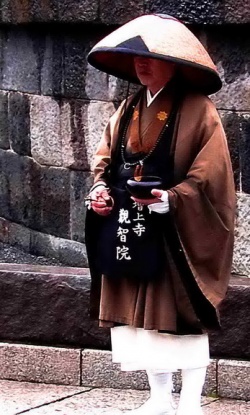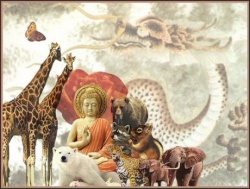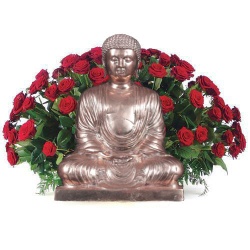The Gospel of Buddha:Chapter 25: Jetavana
Anathapindika, the friend of the destitute and the supporter of orphans,
having returned home, saw the garden of the heir-apparent, Jeta,
with its green groves and limpid rivulets, and thought:
"This is the place which will be most suitable
as a vihara for the brotherhood of the Blessed One."
And he went to the prince and asked leave to buy the ground. [1]
The prince was not inclined to sell the garden, for he valued it highly.
He at first refused but said at last,
"If thou canst cover it with gold, then,
and for no other price, shalt thou have it." [2]
Anathapindika rejoiced and began to spread his gold; but Jeta said:
"Spare thyself the trouble, for I will not sell."
But Anathapindika insisted.
Thus they contended until they resorted to the magistrate. [3]
Meanwhile the people began to talk of the unwonted proceeding,
and the prince, hearing more of the details
and knowing that Anathapindika was not only very wealthy
but also straightforward and sincere, inquired into his plans.
On hearing the name of the Buddha,
the prince became anxious to share in the foundation
and he accepted only one-half of the gold, saying:
"Yours is the land, but mine are the trees.
I will give the trees as my share of this offering to the Buddha." [4]
Then Anathapindika took the land and Jeta the trees,
and they placed them in trust of Sariputta for the Buddha. [5]
After the foundations were laid,
they began to build the hall which rose loftily in due proportions
according to the directions which the Buddha had suggested;
and it was beautifully decorated with appropriate carvings. [6]
This vihara was called Jetavana,
and the friend of the orphans invited the Lord to come to Savatthi and receive the donation.
And the Blessed One left Kapilavatthu and came to Savatthi. [7]
While the Blessed One was entering Jetavana,
Anathapindika scattered flowers and burned incense,
and as a sign of the gift
he poured water from a golden dragon decanter, saying:
"This Jetavana vihara
I give for the use of the brotherhood throughout the world." [8]
The Blessed One received the gift and replied:
"May all evil influences be overcome;
may the offering promote the kingdom of righteousness
and be a permanent blessing to mankind in general,
to the land of Kosala, and especially also to the giver." [9]
Then the king Pasenadi, hearing that the Lord had come,
went in his royal equipage to the Jetavana vihara
and saluted the Blessed One with clasped hands, saying: [10]
"Blessed is my unworthy and obscure kingdom
that it has met with so great a fortune.
For how can calamities and dangers befall it
in the presence of the Lord of the world,
the Dharmaraja, the King of Truth. [11]
"Now that I have seen thy sacred countenance,
let me partake of the refreshing waters of thy teachings. [12]
"Worldly profit is fleeting and perishable,
but religious profit is eternal and inexhaustible.
A worldly man, though a king, is full of trouble,
but even a common man who is holy has peace of mind." [13]
Knowing the tendency of the king's heart,
weighed down by avarice and love of pleasure,
the Buddha seized the opportunity and said: [14]
"Even those who, by their evil karma,
have been born in low degree,
when they see a virtuous man, feel reverence for him.
How much more must an independent king,
on account of merits acquired in previous existences,
when meeting a Buddha, conceive reverence for him. [15]
"And now as I briefly expound the law,
let the Maharaja listen and weigh my words,
and hold fast that which I deliver! [16]
"Our good or evil deeds follow us continually like shadows. [17]
"That which is most needed is a loving heart! [18]
"Regard thy people as men do an only son.
Do not oppress them, do not destroy them;
keep in due check every member of thy body,
forsake unrighteous doctrine and walk in the straight path.
Exalt not thyself by trampling down others,
but comfort and befriend the suffering. [19]
"Neither ponder on kingly dignity,
nor listen to the smooth words of flatterers. [20]
"There is no profit in vexing oneself by austerities,
but meditate on the Buddha and weigh his righteous law. [21]
"We are encompassed on all sides by the rocks of birth, old age, disease, and death,
and only by considering and practising the true law
can we escape from this sorrow-piled mountain. [22]
"What profit, then, in practising iniquity? [23]
"All who are wise spurn the pleasures of the body.
They loathe lust and seek to promote their spiritual existence. [24]
"When a tree is burning with fierce flames,
how can the birds congregate therein?
Truth cannot dwell where passion lives.
He who does not know this,
though he be a learned man
and be praised by others as a sage,
is beclouded with ignorance. [25]
"To him who has this knowledge true wisdom dawns,
and he will beware of hankering after pleasure.
To acquire this state of mind, wisdom is the one thing needful.
To neglect wisdom will lead to failure in life. [26]
"The teachings of all religions should centre here,
for without wisdom there is no reason. [27]
"This truth is not for the hermit alone;
it concerns every human being, priest and layman alike.
There is no distinction between the monk who has taken the vows,
and the man of the world living with his family.
There are hermits who fall into perdition,
and there are humble householders who mount to the rank of rishis. [28]
"Hankering after pleasure is a danger common to all;
it carries away the world.
He who is involved in its eddies finds no escape.
But wisdom is the handy boat, reflection is the rudder.
The slogan of religion calls you to overcome the assaults of Mara, the enemy. [29]
"Since it is impossible to escape the result of our deeds,
let us practise good works. [30]
"Let us guard our thoughts that we do no evil,
for as we sow so shall we reap. [31]
"There are ways from light into darkness and from darkness into light.
There are ways, also, from the gloom into deeper darkness, and from the dawn into brighter light.
The wise man will use the light he has to receive more light.
He will constantly advance in the knowledge of truth. [32]
"Exhibit true superiority by virtuous conduct and the exercise of reason;
meditate deeply on the vanity of earthly things,
and understand the fickleness of life. [33]
"Elevate the mind,
and seek sincere faith with firm purpose;
transgress not the rules of kingly conduct,
and let your happiness depend,
not upon external things,
but upon your own mind.
Thus you will lay up a good name for distant ages
and will decure the favour of the Tathagata." [34]
The king listened with reverence
and remembered all the words of the Buddha
in his heart. [35]
Continue Reading
- The Gospel of Buddha: Preface
- The Gospel of Buddha:Chapter 01: Rejoice
- The Gospel of Buddha:Chapter 02: Samsara and Nirvana
- The Gospel of Buddha:Chapter 03: Truth the Saviour
- The Gospel of Buddha:Chapter 04: The Bodhisatta's Birth
- The Gospel of Buddha:Chapter 05: The Ties of Life
- The Gospel of Buddha:Chapter 06: The Three Woes
- The Gospel of Buddha:Chapter 07: The Bodhisatta's Renunciation
- The Gospel of Buddha:Chapter 08: King Bimbisara
- The Gospel of Buddha:Chapter 09: The Bodhisatta's Search
- The Gospel of Buddha:Chapter 10: Uruvela, the Place of Mortification
- The Gospel of Buddha:Chapter 11: Mara, the Evil One
- The Gospel of Buddha:Chapter 12: Enlightenment
- The Gospel of Buddha:Chapter 13: The First Converts
- The Gospel of Buddha:Chapter 14: Brahma's Request
- The Gospel of Buddha:Chapter 15: Upaka
- The Gospel of Buddha:Chapter 16: The Sermon at Benares
- The Gospel of Buddha:Chapter 17: The Sangha
- The Gospel of Buddha:Chapter 18: Yasa, the Youth of Benares
- The Gospel of Buddha:Chapter 19: Kassapa
- The Gospel of Buddha:Chapter 20: The Sermon at Rajagaha
- The Gospel of Buddha:Chapter 21: The King's Gift
- The Gospel of Buddha:Chapter 22: Sariputta and Moggallana
- The Gospel of Buddha:Chapter 23: Anathapindika
- The Gospel of Buddha:Chapter 24: The Sermon on Charity
- The Gospel of Buddha:Chapter 25: Jetavana
- The Gospel of Buddha:Chapter 26: The Three Characteristics and the Uncreate
- The Gospel of Buddha:Chapter 27: The Buddha's Father
- The Gospel of Buddha:Chapter 28: Yasodhara
- The Gospel of Buddha:Chapter 29: Rahula
- The Gospel of Buddha:Chapter 30: Jivaka, the Physician
- The Gospel of Buddha:Chapter 31: The Buddha's Parents Attain Nirvana
- The Gospel of Buddha:Chapter 32: Women Admitted to the Sangha
- The Gospel of Buddha:Chapter 33: The Bhikkhus' Conduct Toward Women
- The Gospel of Buddha:Chapter 34: Visakha
- The Gospel of Buddha:Chapter 35: The Uposatha and Patimokkha
- The Gospel of Buddha:Chapter 36: The Schism
- The Gospel of Buddha:Chapter 37: The Re-establishment of Concord
- The Gospel of Buddha:Chapter 38: The Bhikkhus Rebuked
- The Gospel of Buddha:Chapter 39: Devadatta
- The Gospel of Buddha:Chapter 40: Name and Form
- The Gospel of Buddha:Chapter 41: The Goal
- The Gospel of Buddha:Chapter 42: Miracles Forbidden
- The Gospel of Buddha:Chapter 43: The Vanity of Worldliness
- The Gospel of Buddha:Chapter 44: Secrecy and Publicity
- The Gospel of Buddha:Chapter 45: The Annihilation of Suffering
- The Gospel of Buddha:Chapter 46: Avoiding the Ten Evils
- The Gospel of Buddha:Chapter 47: The Preacher's Mission
- The Gospel of Buddha:Chapter 48: The Dhammapada
- The Gospel of Buddha:Chapter 49: The Two Brahmans
- The Gospel of Buddha:Chapter 50: Guard the Six Quarters
- The Gospel of Buddha:Chapter 51: Simha's Question Concerning Annihilation
- The Gospel of Buddha:Chapter 52: All Existence is Spiritual
- The Gospel of Buddha:Chapter 53: Identity and Non-Identity
- The Gospel of Buddha:Chapter 54: The Buddha Omnipresent
- The Gospel of Buddha:Chapter 55: One Essence, One Law, One Aim
- The Gospel of Buddha:Chapter 56: The Lesson Given to Rahula
- The Gospel of Buddha:Chapter 57: The Sermon on Abuse
- The Gospel of Buddha:Chapter 58: The Buddha Replies to the Deva
- The Gospel of Buddha:Chapter 59: Words of Instruction
- The Gospel of Buddha:Chapter 60: Amitabha
- The Gospel of Buddha:Chapter 61: The Teacher Unknown
- The Gospel of Buddha:Chapter 62: Parables
- The Gospel of Buddha:Chapter 63: The Widow's Two Mites and the Parable of the Three Merchants
- The Gospel of Buddha:Chapter 64: The Man Born Blind
- The Gospel of Buddha:Chapter 65: The Lost Son
- The Gospel of Buddha:Chapter 66: The Giddy Fish
- The Gospel of Buddha:Chapter 67: The Cruel Crane Outwitted
- The Gospel of Buddha:Chapter 68: Four Kinds of Merit
- The Gospel of Buddha:Chapter 69: The Light of the World
- The Gospel of Buddha:Chapter 70: Luxurious Living
- The Gospel of Buddha:Chapter 71: The Communication of Bliss
- The Gospel of Buddha:Chapter 72: The Listless Fool
- The Gospel of Buddha:Chapter 73: Rescue in the Desert
- The Gospel of Buddha:Chapter 74: The Sower
- The Gospel of Buddha:Chapter 75: The Outcast
- The Gospel of Buddha:Chapter 76: The Woman at the Well
- The Gospel of Buddha:Chapter 77: The Peacemaker
- The Gospel of Buddha:Chapter 78: The Hungry Dog
- The Gospel of Buddha:Chapter 79: The Despot
- The Gospel of Buddha:Chapter 80: Vasavadatta
- The Gospel of Buddha:Chapter 81: The Marriage-Feast in Jambunada
- The Gospel of Buddha:Chapter 82: A Party in Search of a Thief
- The Gospel of Buddha:Chapter 83: In the Realm of Yamaraja
- The Gospel of Buddha:Chapter 84: The Mustard Seed
- The Gospel of Buddha:Chapter 85: Following the Master Over the Stream
- The Gospel of Buddha:Chapter 86: The Sick Bhikkhu
- The Gospel of Buddha:Chapter 87: The Patient Elephant
- The Gospel of Buddha:Chapter 88: The Conditions of Welfare
- The Gospel of Buddha:Chapter 89: Sariputta's Faith
- The Gospel of Buddha:Chapter 90: Pataliputta
- The Gospel of Buddha:Chapter 91: The Mirror of Truth
- The Gospel of Buddha:Chapter 92: Ambapali
- The Gospel of Buddha:Chapter 93: The Buddha's Farewell Address
- The Gospel of Buddha:Chapter 94: The Buddha Announces His Death
- The Gospel of Buddha:Chapter 95: Chunda, the Smith
- The Gospel of Buddha:Chapter 96: Metteyya
- The Gospel of Buddha:Chapter 97: The Buddha's Final Entering into Nirvana
- The Gospel of Buddha:Chapter 98: The Three Personalities of the Buddha
- The Gospel of Buddha:Chapter 99: The Purpose of Being
- The Gospel of Buddha:Chapter 100: The Praise of All the Buddhas

